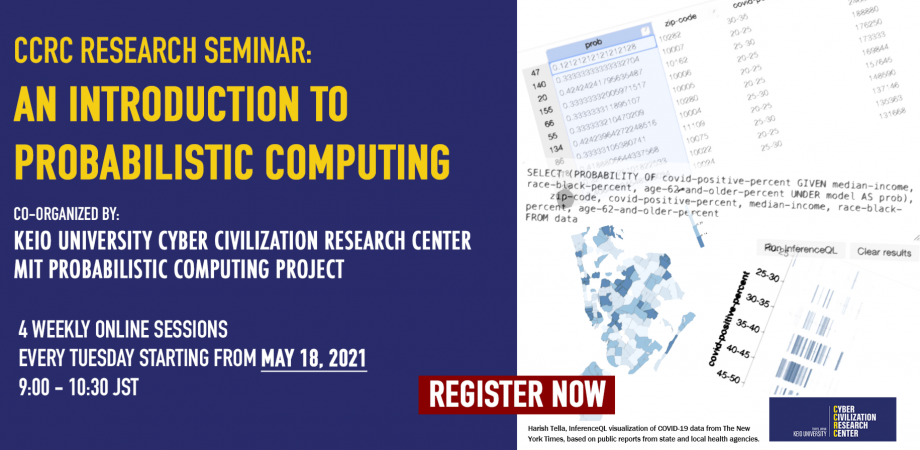#日本語の記事はこちら
Spring 2021: Research Seminar on an Introduction to Probabilistic Computing
Organized by Keio University Cyber Civilization Research Center, MIT Probabilistic Computing Project
Date: 4 weekly online sessions on Tuesday from May 18th to June 8th
Time: 9:00 – 10:30 (JST)
Language: English
Registration Fee: Free
Eligibility: Some familiarity with either machine learning, statistics, probability, or AI.
Registration: Complete the Peatix Registration form
Registration Deadline: May 13, 11:50 PM (JST)
Overview:
Probabilistic computing proposes a new unifying artificial intelligence (AI) paradigm that combines the best of generative modeling and probabilistic inference with symbolic programming and neural networks. Example applications include automated data modeling, knowledge-based data cleaning, and common-sense 3D scene understanding. The seminar will survey example applications, and introduce the fundamental ideas they are based on, including core concepts such as generative programs, inference programs, and generative meta-programs that learn generative programs from data. There will be some hands-on exploration of these techniques.
Syllabus:
May 18: Overview of probabilistic computing
May 25: Bayesian data cleaning
June 1: Learning generative programs from data
June 8: Interactive problem session on automated data modeling
Remarks:
The seminar will be held online through Zoom.
The Zoom link will be distributed to participants later via email.
No official credit will be awarded by taking this seminar.
*Should you have any questions, please contact TA: Taro Tsuchiya (taro.f.tsuchiya<at>keio.jp)
Lecturer:
Dr. Freer’s research uses techniques from theoretical computer science, programming languages, and probability to understand the underlying principles of how randomness affects computing, and to explore its implications for building more effective computational systems. His current research focuses on the foundations of probabilistic computing, efficient samplers and testing methods for probabilistic inference, and the mathematics of random structures.
Freer is currently a Research Scientist in the MIT Probabilistic Computing Project. Previously he has held postdoctoral roles in MIT’s Department of Mathematics, Department of Brain and Cognitive Sciences, and Computer Science and Artificial Intelligence Laboratory, and at the University of Hawaii at Manoa. Freer has also been a Lyric Labs Visiting Fellow at Analog Devices, a Research Scientist at Gamalon Labs, and Chief Scientist at Remine. He received his Ph.D. in Mathematics from Harvard University in 2008.
About the MIT Probabilistic Computing Project
We aim to improve our ability to engineer artificial intelligence, reverse-engineer natural intelligence, and deploy applications that increase our collective intelligence and well-being.
Our work integrates probabilistic inference, generative models, and Monte Carlo methods into the building blocks of software, hardware, and other computational systems. For example, we have developed high-level probabilistic programming languages, automated Bayesian data modeling systems, Bayesian inverse graphics approaches to 3D computer vision, and near-optimal algorithms, circuits, and hardware architectures for Monte Carlo. We test our results by collaborating with domain experts on practical applications.
In addition to core academic research and teaching, we mentor engineers and entrepreneurs, develop open source software, and lead hands-on AI workshops for the industry. These activities have led to: VC-backed startups acquired by Salesforce (2012) and Tableau (2018), the founding in 2020 of Common Sense Machines, and a new Intel Center for Probabilistic Computing. We also carry out joint development and field testing with partners from both the public and private sectors.
 Contact us
Contact us
